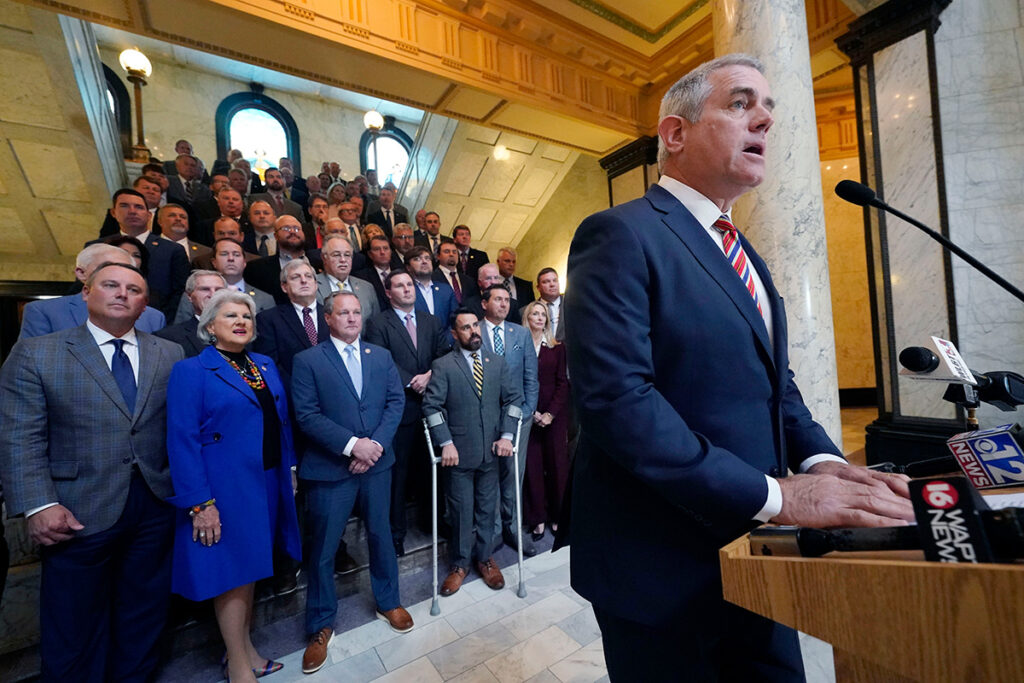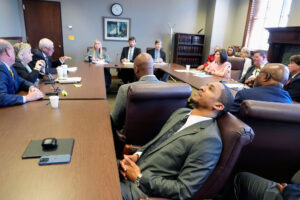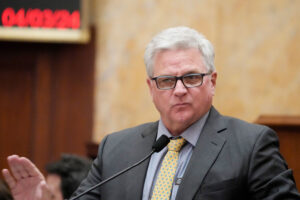JACKSON, Miss.—A majority on the Mississippi Ethics Commission has rejected its staff’s recommendation to affirm that the Mississippi House of Representatives is a “public body” that is subject to the Mississippi Open Meetings Act in a 5-3 vote.
The Ethics Commission’s vote today and its Director Tom Hood’s Dec. 1 recommendation grew out of reporter Nick Judin’s blocked efforts to attend House Republican caucuses at the Capitol with Speaker Philip Gunn presiding over regular closed Republican caucus meetings where members discuss legislation and then usually vote in tandem. The Republican Caucus numbers 75 of 122 elected members of the House of Representatives.
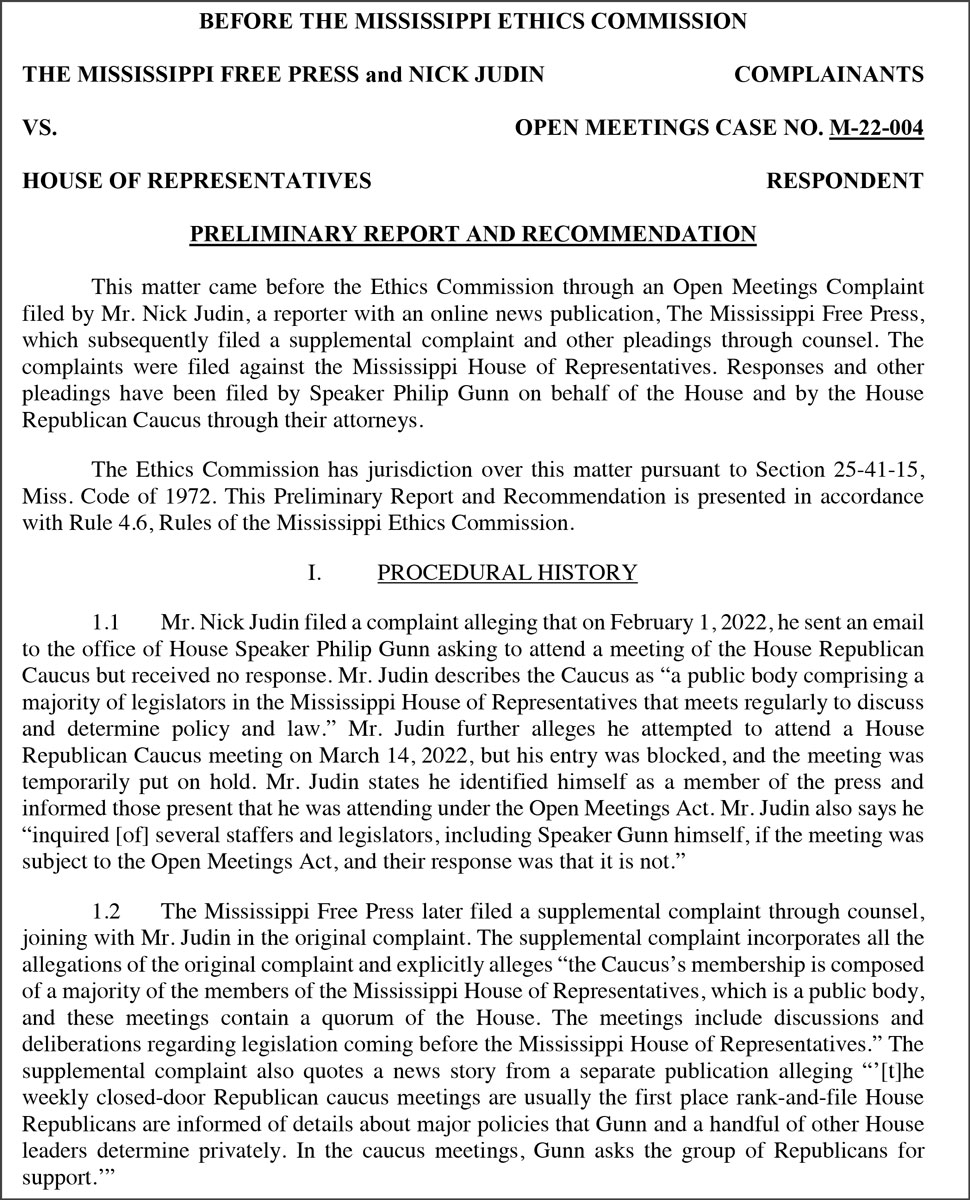
In his Dec. 2 recommendations to the full commission, Director Hood responded to a legal complaint by the Mississippi Free Press with recommendations that the body affirm that the Mississippi House of Representatives is a “public body” and thus subject to the Open Meetings Act. Had the commission accepted Hood’s suggestions, it would have clarified that the House of Representatives is indeed a public body subject to the Open Meetings Law and that weekly Republican caucus meetings attended by a majority of House members to discuss legislation should be open to reporters and the public in the future.
This morning, in a vote of 5-3, the full ethics commission rejected a key part of its director’s six-page recommendation that would have made House Speaker Gunn’s caucus meetings open to the press and the public, if accepted. The governor, lieutenant governor, House speaker and the chief justice of the Mississippi Supreme Court appoint the eight members of the committee.
Chairman Ben Stone, Vice Chairman Sean A. Milner, Stephen W. Burrow, Erin P. Lane and Samuel C. Kelly all voted against the recommendations. Secretary Ron E. Crowe, Robert G. Waites and Maxwell J. Luter voted in favor of the recommendations.
The Ethics Committee is now set to adjudicate the specific language with which they will explain their rejection of the Mississippi Free Press complaint and Director Hood’s recommendations.
Debating Whether House Is Public Body
The Mississippi Free Press, through attorney Rob McDuff of the Mississippi Center for Justice, argued that “the Caucus’s membership is composed of a majority of the members of the Mississippi House of Representatives, which is a public body, and these meetings contain a quorum of the House. The meetings include discussions and deliberations regarding legislation coming before the Mississippi House of Representatives.”
Tom Hood’s Dec. 2 recommendation to the full commission agreed with this publication’s argument that the Mississippi House is a “public body” just like the Senate, which does not hold closed partisan caucus meetings to discuss legislation. Hood called the public-body question “the primary question of law in this case.”
“It is essential to the fundamental philosophy of the American constitutional form of representative government and to the maintenance of a democratic society that public business undertaken by a quorum of the House of Representatives be performed in an open and public manner,” Hood wrote in his capacity as hearing officer.
“The formation and determination of public policy by a quorum of the House is public business and must be conducted at open meetings.”
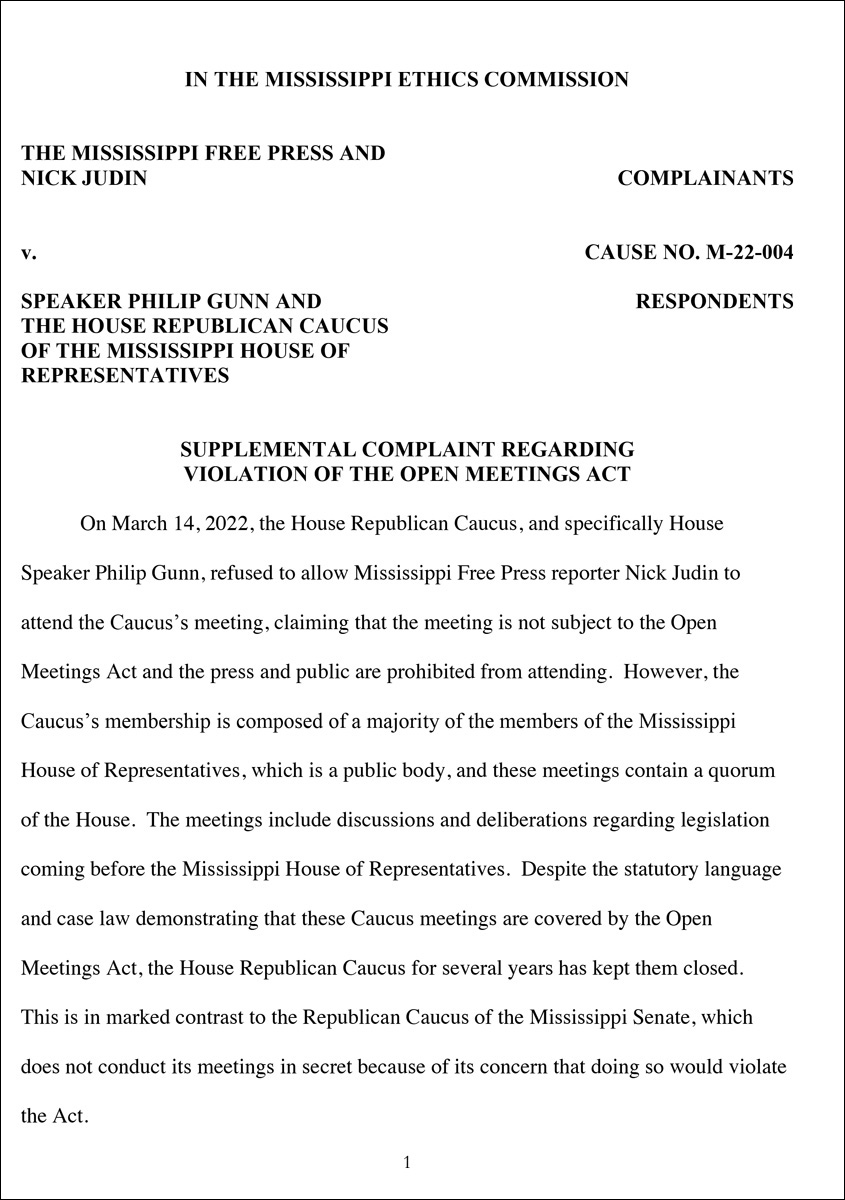
Stephen W. Burrow summarized his opposition to the complaint by highlighting the lack of explicit reference to the Legislature in the Open Meetings Act. “It boils down to analysis of the definition,” Burrow explained. “I don’t think anybody disagrees that that definition (of public body) here is very vague. It’s ambiguous. Um, what strikes me about the definition is that … they would include specific references to certain types of committees, but not include a specific reference to themselves.”
But it was this exact definition that Hood suggested includes the Legislature. “Section 25-41-3(a)(vi) explicitly exempts ‘Legislative subcommittees and legislative conference committees.’” Hood wrote in his recommendations. “If, as the House contends, it is not a ‘public body,’ then it seems pointless to explicitly exclude any of its committees.”
Ron Crowe, himself a former executive director of the Mississippi Ethics Commission, said that in a previous meeting “the one thing we all agreed is … how unclear of a law (The Open Meetings Act) is.” But Crowe expressed that “I really don’t see how we could say that the Legislature is not included because they did not exclude themselves.” He voted for Hood’s recommendations.
As did Maxwell J. Luter. He commented in the hearing that the language of the Open Meetings Act includes the Legislature. “I don’t understand why the Legislature would feel the need to have put (rules for going into executive session) for ‘any body of the Legislature which is meeting on matters within the jurisdiction of such body.’ That’s still very firm on saying they’re subject to the Open Meetings Act,” he said.
‘Not the Question That We’re Faced With’
Most of the committee members who spoke against the recommendations acknowledged that their comments were not intended to discourage the Legislature against transparency. Sean A. Milner backed Burrow’s interpretation of the rule, but acknowledged what he believed the law should include. “I agree that I think the Legislature should be a part of the Open Meetings Act. But that’s not the question that we’re faced with,” Milner said today.
In Hood’s recommendation, he argued that in instances of vague language, it was the commission’s job to err on the side of transparency. “The commission also relied heavily on language from Mississippi Supreme Court decisions which stress the importance of leaning toward openness in cases of statutory ambiguity,” Hood wrote.
Hood also rejected responses from both Gunn and the House Republican Caucus that the MFP’s complaint raises “nonjusticiable political issues” that neither the commission or the courts can address.
“[T]he Open Meetings case now before the commission involves a statute which the Legislature has assigned to the Ethics Commission to enforce, not a legislative rule. Section 25-41-15,” Hood wrote in his now-rejected recommendation. He also rejected the argument that either the Ethics Commission or the courts applying the Open Meetings Act to the House at all would violate the Separation of Powers Doctrine, calling the respondents’ argument “meritless.”
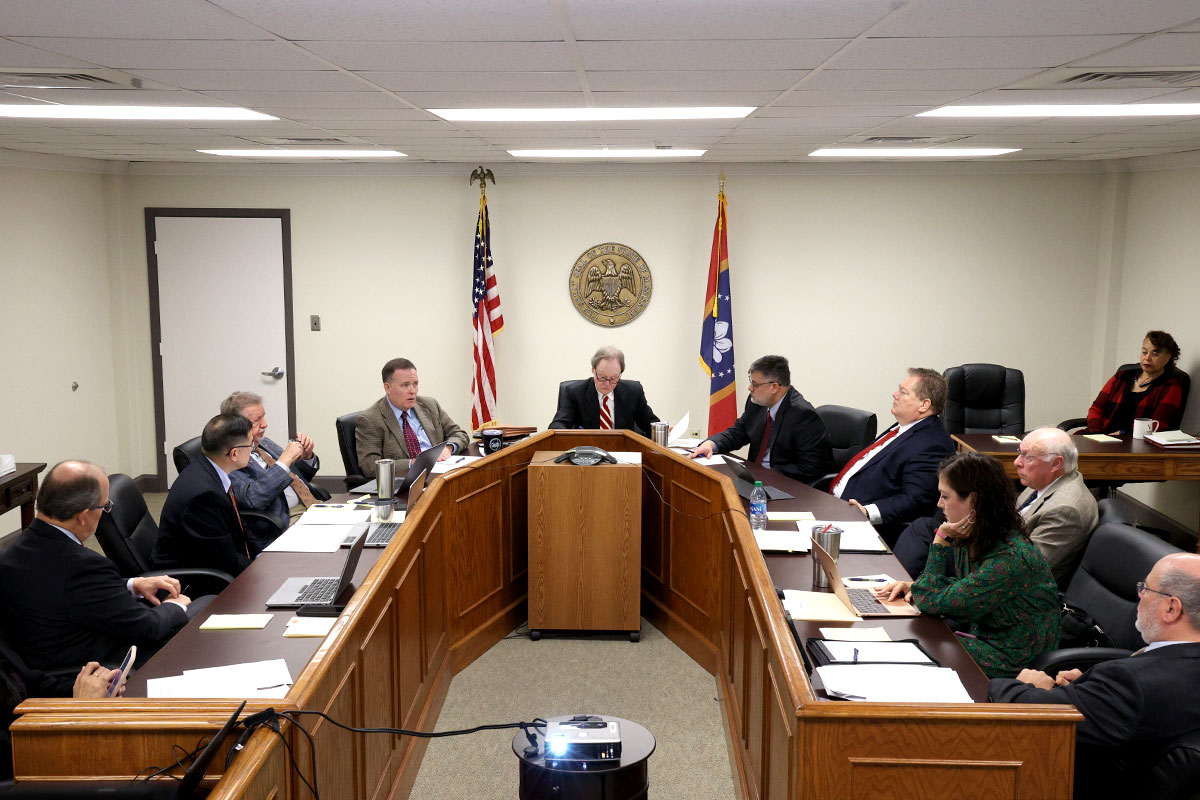
Hood’s recommendation overtly supported the Mississippi Free Press’ argument that the Republican House caucus, which contains a majority of the entire House, should meet in public view to discuss its plans for voting on and passing legislation.
“A quorum of the House of Representatives numbers at least 62 of it(s) 122 members,” Hood wrote in his capacity as hearing officer. “The Republican Caucus currently includes 75 of those members. Whenever 62 or more House members assemble and deliberate a matter under their authority, such as legislation, then a meeting has occurred under the Open Meetings Act. Unless the members vote by a three-fifths majority to enter executive session, the meeting must be open to the public.”
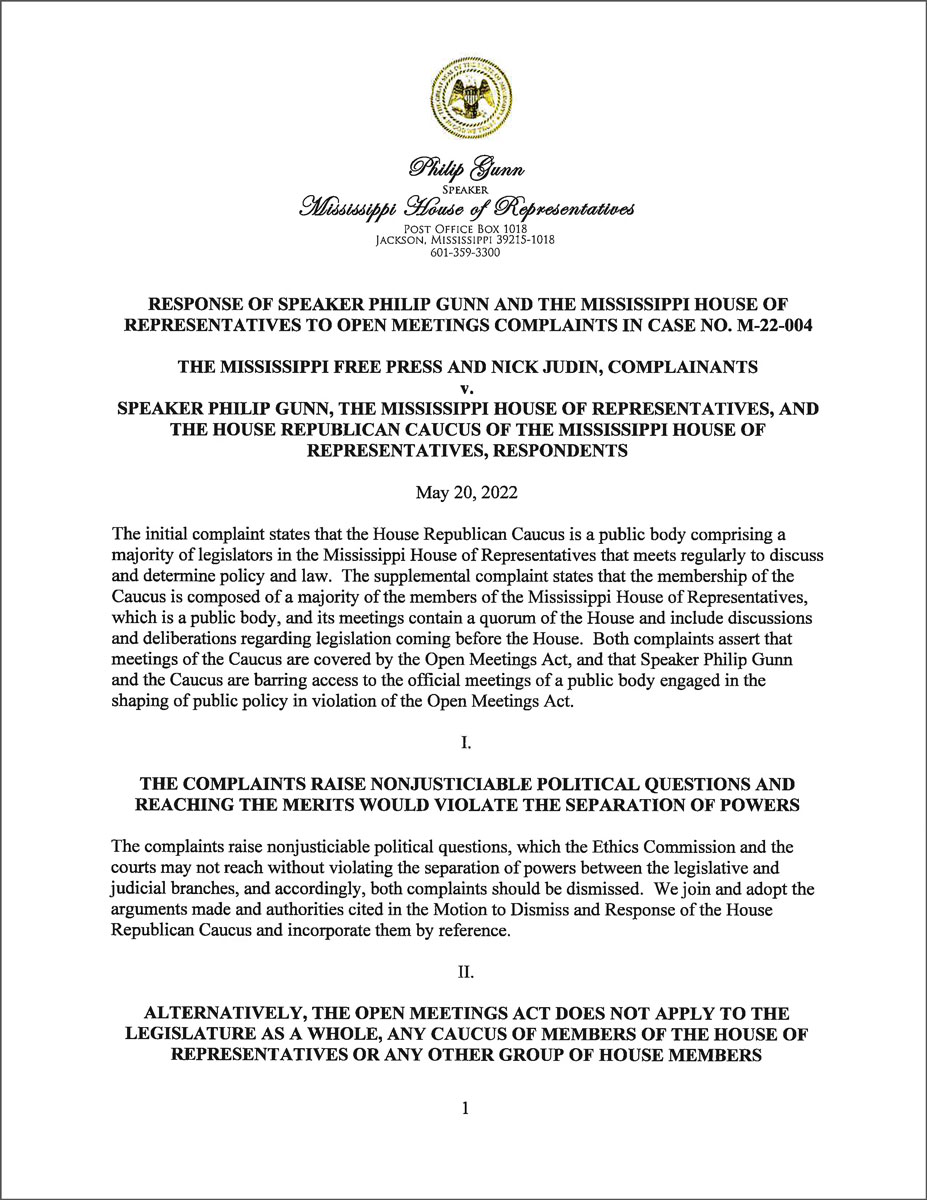
‘Maintenance of a Democratic Society’
Tom Hood’s recommendations also argued that respondents’ arguments about the Legislature not being an explicit “public body” in state law “are tortured, misplaced and fail to recognize the overarching public policy declared by the Legislature at the outset of the Open Meetings Act.”
“It is essential to the fundamental philosophy of the American constitutional form of representative government and to the maintenance of a democratic society that public business undertaken by a quorum of the House of Representatives be performed in an open and public manner,” Hood wrote. “The formation and determination of public policy by a quorum of the House is public business and must be conducted at open meetings.”
Hood cited the Mississippi Supreme Court in the 1989 case Hinds County Board of Supervisors v. Common Causes of Mississippi, which explicitly affirmed the Open Meeting Law’s intent to support the right of the press to attend meetings of public bodies:
“Every member of every board and commission in this state should always bear in mind that the spirit of the Act is that a citizen spectator, including any representative of the press, has just as much right to attend the meeting and see and hear everything as has any member of the board or commission,” Hood quoted.
The Ethics Committee adopted Hood’s first two recommendations in full, establishing that the question falls within the committee’s authority to answer and affirming that the House Republican Caucus is not itself a public body.
Ashton Pittman contributed to this report.

